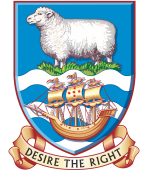Although much of the farmland in the Falkland Islands is extensively grazed and free from chemicals, to obtain a market premium for wool or meat produce, farms need to be organically accredited.
The Falkland Islands Development Scheme (FIDC) set up a locally accredited organics scheme in March 2001, which a number of farms joined up to. However, in order to be internationally recognised as organic, farms would need to sign up to an international accreditation scheme.
Following investigation, it was found that the Biological Farmers of Australia (BFA) provided a scheme that would adapt easily to the Falkland Islands, as it was designed to cater for a similar extensive or rangeland grazing management system.
In order to establish links between the BFA and DoA and for staff to be properly trained to run the scheme in the Islands, two new advisors for the DoA were trained by the BFA before they arrived in the Falklands. Later on, Andrew Monk, representing the BFA, visited the Falkland Islands and negotiated the details of the agreement.
Following this, the first Falkland Islands farm joined up to the BFA scheme in August 2008. In the scheme there are now 7 fully accredited farms and 1 farm in conversion.
For some farmers, there has been very little need to change much of their farm management. The areas that require the most change is mainly relating to fertiliser use and worm drenches.
Farms are required to produce an Organic Farm Plan and the BFA costs involved are covered by the farm business. Once established, there is a 1% levy on all organic produce sold and an annual fee.
The role of the Department of Agriculture is to manage the development of the scheme, including research, promotion, advising and auditing the scheme and farms involved.
It is hoped more farms will join the BFA scheme, but the next step is to help sort out the most efficient organic management systems for the current farms involved and to audit the scheme in the annual audit process.

